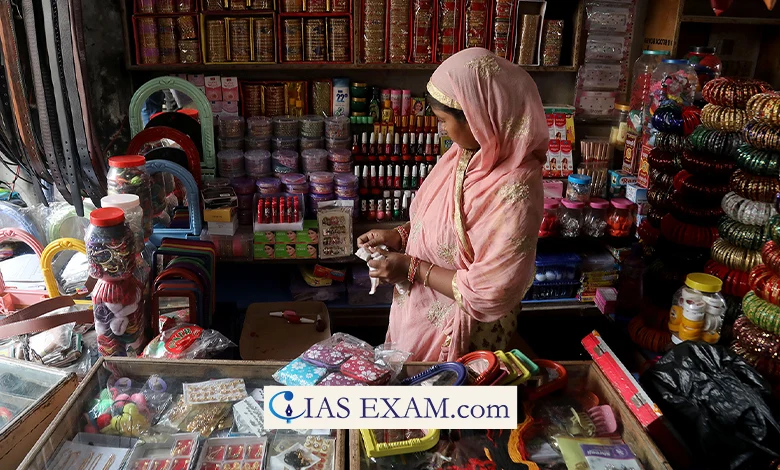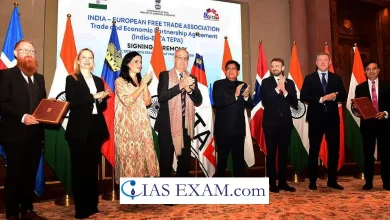UPSC Editorial Analysis
Challenges with India’s MSME Sector
GS Paper 2 - Govt. Policies & Interventions

Context
In recent times, the MSME sector has become a key driver of India’s economy fostering entrepreneurship and creating significant employment opportunities with low capital investment. It plays a vital role in the country’s inclusive industrial development, complementing large industries as ancillary units.
Despite its contributions, the MSME sector grapples with significant challenges, including access to finance, technology adoption and global market competitiveness.
About MSMEs
- The acronym MSME stands for Micro, Small, and Medium Enterprises. MSMEs are businesses that manufacture, process, and preserve goods and commodities.
- These are essentially classed according to their investment in manufacturing plant and machinery or service enterprise equipment, as well as their annual revenue.
- The Ministry of Micro, Small, and Medium Enterprises was formed in 2007 by the merger of the Ministries of Small Scale Industries and Agro and Rural Industries. It sets policies, organizes initiatives, and supervises implementation to help MSMEs expand.
- The Micro, Small, and Medium Enterprises Development Act of 2006 addresses a variety of issues impacting MSMEs, creates a National Board for MSMEs, defines the term “enterprise,” and enables the Central Government to improve MSME competitiveness.
Significance of MSMEs in India’s Growth
- Contribution in GDP and Employment Generation – MSMEs today contribute around 30% of India’s GDP, playing an important role in fueling economic growth. Furthermore, MSMEs are labor-intensive and play an important role in producing job opportunities in a variety of industries. They presently employ approximately 11 crore people in India.
- Contribution to Manufacturing Output – MSMEs contribute significantly to the country’s manufacturing output, particularly in sectors like food processing, engineering, and chemicals.
- Export Promotion – Currently, MSMEs account for almost 45% of India’s exports. Their diversified product portfolio, which frequently caters to specialized markets, boosts India’s global trading position. The Indian handicraft sector, characterized by small-scale craftsmen and firms, has a global market and contributes significantly to the country’s export earnings.
- Rural Industrialization: MSMEs play a pivotal role in driving rural industrialization and promoting inclusive growth. The Khadi and Village industries sector, consisting of small-scale units, has been instrumental in providing employment opportunities in rural areas and empowering local communities.
Govt. Initiatives for MSMEs
- Pradhan Mantri MUDRA Yojana: It provides loans up to 10 lakh to the non-corporate, non-farm small/micro enterprises. These loans are classified as MUDRA loans.
- Credit Guarantee Schemes: It is offered by the Credit Guarantee Fund Trust for Micro and Small Enterprises (CGTMSE) to mitigate the risk for banks and financial institutions, making it easier for MSMEs to access credit.
- MSME SAMADHAN: It is an online Delayed Payment Monitoring System, governed by the Micro and Small Enterprise Facilitation Council for settlement of disputes on getting references/filing on Delayed payments by aggrieved MSMEs (Micro, Small and Medium Enterprises), who can do the filing of cases and tracking of status online
- Government e-Marketplace (GeM): This online platform facilitates public procurement from MSMEs, providing them with access to a wider market.
- Udyam Registration: A simplified online registration process for MSMEs to avail government benefits and schemes.
- CHAMPIONS Portal: It is an ICT-driven Control Room and Management Information System focused on enhancing output and national strength through modern processes.
Challenges related to MSME
- Lack of adequate Access to Finance – Despite government initiatives such as Mudra loans, accessing finance remains a significant barrier for MSMEs. Traditional banks frequently see them as high-risk borrowers due to their low credit history and collateral. This reduces their capacity to invest in growth, innovation, and working capital.
- Delayed Payments – One of the most significant issues that MSMEs encounter is receiving delayed payments from larger corporations or government bodies. This can put a strain on their working capital and cash flow, limiting their capacity to function efficiently.
- Limited Skilled Workforce – Many MSMEs struggle to recruit employees with the expertise required to run complex machinery or integrate new technology. This can result in inefficiencies, manufacturing delays, and lower product quality.
- Limited Outreach – MSMEs frequently lack the necessary resources and experience to effectively promote their products and raise brand recognition. This makes it tough to compete with larger businesses or established brands, particularly in the Internet industry.
- Infrastructure Constraints – Inadequate infrastructure, such as poor road connectivity, unreliable power supply, and lack of access to modern facilities, can significantly hinder the operations and growth of MSMEs.
SOURCE: The Hindu





.png)



